新概念英语青少版2A语法大全
新概念英语青少版2A知识点整理
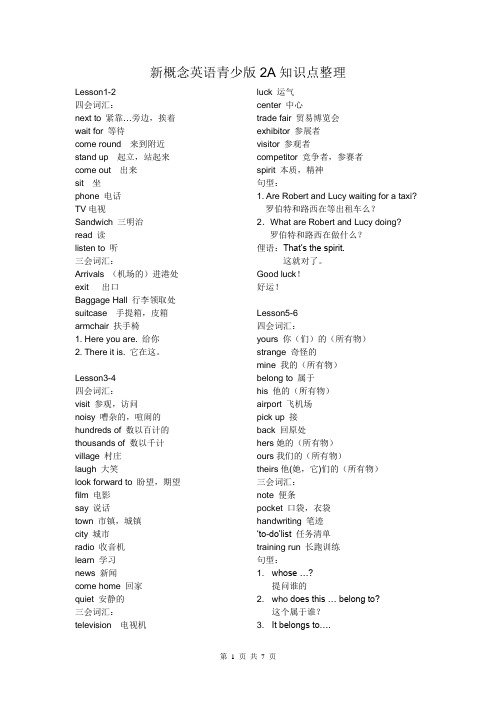
新概念英语青少版2A知识点整理Lesson1-2四会词汇:next to 紧靠…旁边,挨着wait for 等待come round 来到附近stand up 起立,站起来come out 出来sit 坐phone 电话TV电视Sandwich 三明治read 读listen to 听三会词汇:Arrivals (机场的)进港处exit 出口Baggage Hall 行李领取处suitcase 手提箱,皮箱armchair 扶手椅1. Here you are. 给你2. There it is. 它在这。
Lesson3-4四会词汇:visit 参观,访问noisy 嘈杂的,喧闹的hundreds of 数以百计的thousands of 数以千计village 村庄laugh 大笑look forward to 盼望,期望film 电影say 说话town 市镇,城镇city 城市radio 收音机learn 学习news 新闻come home 回家quiet 安静的三会词汇:television 电视机luck 运气center 中心trade fair 贸易博览会exhibitor 参展者visitor 参观者competitor 竞争者,参赛者spirit 本质,精神句型:1. Are Robert and Lucy waiting for a taxi? 罗伯特和路西在等出租车么?2.What are Robert and Lucy doing?罗伯特和路西在做什么?俚语:That’s the spirit.这就对了。
Good luck!好运!Lesson5-6四会词汇:yours 你(们)的(所有物)strange 奇怪的mine 我的(所有物)belong to 属于his 他的(所有物)airport 飞机场pick up 接back 回原处hers她的(所有物)ours我们的(所有物)theirs他(她,它)们的(所有物)三会词汇:note 便条pocket 口袋,衣袋handwriting 笔迹‘to-do’list 任务清单training run 长跑训练句型:1. whose …?提问谁的2. who does this … belong to?这个属于谁?3. It belongs to….它属于…1. let sb. do sth.2. give sb. sth. / give sth. to sb.Lesson 7-8四会词汇:hour 小时put on 穿上walk 走take off 脱下turn on 打开turn off 关掉letter 信throw away 扔掉三会词汇top three percent 最好的百分之三volunteer 自愿者Congratulations! 祝贺Well done! 做得很好!foil jacket 保暖夹克hero英雄this way 这边medal 奖章put up 挂起curtain 窗帘take down 拿下picture 图画so 非常pleased 高兴的Best wishes 最美好的祝福句型:1. Are you going to have a drink?你打算去喝些东西么?2. I’m going to have lunch.我打算去吃午餐。
青少版新概念英语2A
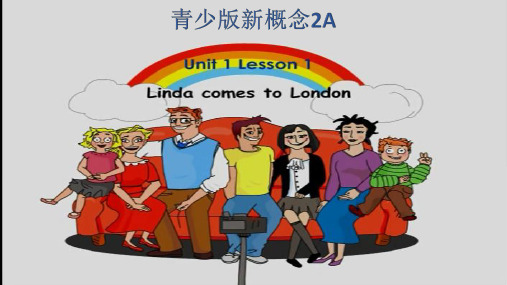
Make a new dailogue.
B A: Hi,_____._________________? B: I'm in the_____________next to the Arrivals exit. Are you waiting for your suitcase? C A: Yes, I'm in the ___________. Is _____with you? B: Yes, of course he/she is.I’m giving him/her my phone now. Here you are, ______. Talk to your friend! C C: Hello, ____.Welcome to _______. A A: Hello,_____. I’ve got my suitcase, and I’m coming out now! C
青少版新概念英语2A Unit 1 Linda comes to London
New Words and Expressions 生词和短语
next to[‘nekst tu] prep.紧靠……旁边 come round [kʌm raund] v.+adv来到附近 Arrivals [ə'raɪvəlz]n. (机场的)进港口 stand [stænd] v.站立 exit [ˈegsɪt] n. 出口 phone [fəʊn]n. 电话 wait for v.+prep 等待 come out v.+adv 出来 Baggage Hall [ˈbægɪdʒ hɔ:l] 行李领取厅 suitcase [ˈsu:tkeɪs] n. 手提箱,皮箱 sit [sɪt]v. 坐
新概念英语青少版2A短语整理
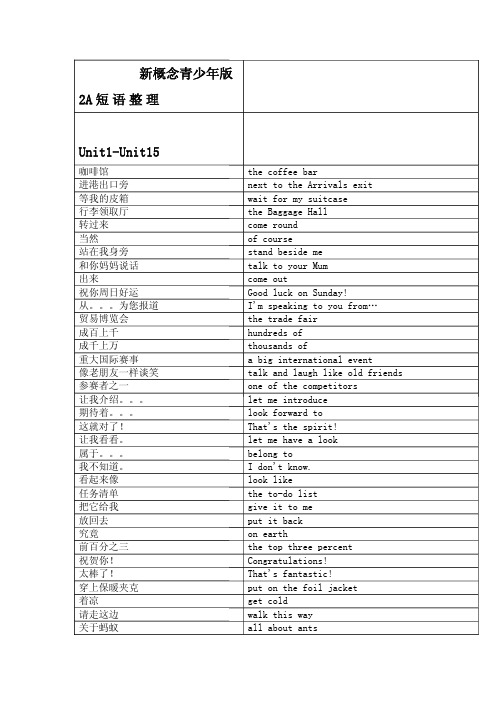
新概念青少年版2A短语整理Unit1-Unit15咖啡馆 the coffee bar进港出口旁 next to the Arrivals exit等我的皮箱 wait for my suitcase行李领取厅 the Baggage Hall转过来 come round当然 of course站在我身旁 stand beside me和你妈妈说话 talk to your Mum出来 come out祝你周日好运 Good luck on Sunday!从。
为您报道 I'm speaking to you from…贸易博览会 the trade fair成百上千 hundreds of成千上万 thousands of重大国际赛事 a big international event像老朋友一样谈笑 talk and laugh like old friends 参赛者之一 one of the competitors让我介绍。
let me introduce期待着。
look forward to这就对了! That's the spirit!让我看看。
let me have a look属于。
belong to我不知道。
I don't know.看起来像 look like任务清单 the to-do list把它给我 give it to me放回去 put it back究竟 on earth前百分之三 the top three percent祝贺你! Congratulations!太棒了! That's fantastic!穿上保暖夹克 put on the foil jacket着凉 get cold请走这边 walk this way关于蚂蚁 all about ants看这网页 look at this webpage查阅关于蚂蚁的资料 look up ants真的很有趣 be really interesting在水下存活 survive under water在水下呼吸 breathe under water上面没说。
新概念英语青少版2Aunit9

Unit 9: Do your own thing一:课文重点:1.Do your own thing. 惯用语:独立做自己的事。
2.I t’s going to be a very early start. It :主语不提供任何信息,居首位是因为英语句子必须有主语和动词,It’s early. It’s half past ten.可以表示时间,距离,天气,等。
3.want: want to do, want me to do, want是及物动词,后面如果没有宾语,意思就不完整,其宾语可以是名词,代词,或者带to的动词不定式。
4.can’t: 表示不允许,禁止,into the Red Zone: into表示进入一个区域或空间,the red zone限制进入的其他区域。
5.The National Athletics Championships: 国家田径锦标赛,(复合名词)Athletic:运动的,体育的,Athletics:田径,体育运动,复合名词中第一个名词在形式上通常是单数,但是athletics 同gymnastics, Mathematics ,Physics等一样,常用复数形式。
二:家长监督:听课文五遍,跟读三遍,单词三遍,并做练习册。
三:预习:Unit 10Unit 10 Tomorrow’s another day!一:课文重点1.题目:传统的谚语,意思是让我们活在现在,不必考虑明天的事情。
2.remember:大多数情况下,remember和know,hear,see, smell, understand 一样,指的是状态和感受。
但是有时也可以指回忆:I am remembering the good times. 我在回忆好时光。
3.take: her jobs take her all over the world. Take在这里是“搬到某处去”的意思,all over the world 遍布世界。
新概念英语青少版2A-Unit3

pick up [pik ʌp]
接(某人)
training run [ˈtreɪnɪŋ rʌn]
长跑 训 练 back [bæ k]
回原处
Why on earth …? [ɜ:θ] 究竟,到底
pick up
• pick up 拾起,安排去接,振作起来,好转,加快,学 会,染上,逮捕,着火,回到,结识,勾搭,为…付款, 纠正,接受挑战,收拾残局 • pick up a foreign language 学会一门外语 • pick up flesh 恢复体重 • pick up one's courage 鼓起勇气 • pick up passengers 让乘客上车 • pick up some knowledge 偶然获得一些知识 • pick up tool 收拾工具 • pick up words and phrases 自学词语
airport
pick up strange pick up training run training run back
airport
Why on earth?
Why on earth?
back
Listening and understanding
• Why is Paul’s ‘to-do list’ in Jack’s pocket? • What do you think?U03-1 Listening and Understanding.mp3
Jack: That’s strange. What’s this note in my pocket ? It isn’t mine .
Is it yours ,Daisy?
let+宾格代词+do belong to+名词或者 Let me open the 代词表示归属 door. Daisy: This book belongs to me. his 第三人称单 No, it isn’t mine. Let me see. 数名词性物主 This book is mine. Oh, it belongs to Paul. 代词 This is my book. The handwriting is his.
青少新概念2A综合知识点

青少新概念2A综合知识点编辑整理:尊敬的读者朋友们:这里是精品文档编辑中心,本文档内容是由我和我的同事精心编辑整理后发布的,发布之前我们对文中内容进行仔细校对,但是难免会有疏漏的地方,但是任然希望(青少新概念2A综合知识点)的内容能够给您的工作和学习带来便利。
同时也真诚的希望收到您的建议和反馈,这将是我们进步的源泉,前进的动力。
本文可编辑可修改,如果觉得对您有帮助请收藏以便随时查阅,最后祝您生活愉快业绩进步,以下为青少新概念2A综合知识点的全部内容。
青少新概念2ALesson1—2四会词汇:next to 紧靠…旁边,挨着wait for 等待come round 来到附近stand up 起立,站起来come out 出来sit 坐phone 电话TV电视Sandwich 三明治read 读listen to 听三会词汇:Arrivals (机场的)进港处exit 出口Baggage Hall 行李领取处suitcase 手提箱,皮箱armchair 扶手椅句型:1.Is Paul eating a sandwich?2.What is Paul doing?俚语:无语法:1. 介词短语2. a+量词+of+名词3. 现在进行时-—--一般疑问句肯否定回答,陈述句句型4. 现在分词变化规则日常情景会话:1. Here you are。
给你2. There it is。
它在这。
Lesson3-4四会词汇:visit 参观,访问noisy 嘈杂的,喧闹的hundreds of 数以百计的thousands of 数以千计village 村庄laugh 大笑look forward to 盼望,期望film 电影say 说话town 市镇,城镇city 城市radio 收音机learn 学习news 新闻come home 回家quiet 安静的三会词汇:television 电视机luck 运气center 中心trade fair 贸易博览会exhibitor 参展者visitor 参观者competitor 竞争者,参赛者spirit 本质,精神句型:1。
青少版新概念英语2A教学重点

Chocolate heaven!
P108
P110
★Did sb. Have any…?
Yes, I / He / She / They / You did.
No, I / He / She / They / You didn't.
★How many / much…did sb. Have?
★Why are you going to…?
Because….
Unit 9
Do your own thing
P68
P70
★What do you want to do?
I want to….
★What do you want sb. to do?
I want sb. to….
★Why do you want sb. to do sth.?
Unit 2
Good luck on Sundaபைடு நூலகம்!
P12
P14
★Who are waiting for a bus?
★What are they doing?
They're……
★What are sb. and sb. doing?
They're…...
★现在进行时
定义:表示此时此刻正在进行的动作。
★时间表达法
……past/to……
半小时以内含半小时,用past,半小时以后用to。
Unit 6
An elegant size
P44
P46
★When do sb. and sb. do sth.?
Unit 7
A good example
P52
P54
青少版新概念2A知识点 (1)

青少版新概念2A知识点 (1)
本文档旨在总结和记录《青少版新概念英语第二册A》课程的主要知识点。
以下是课程中的重点内容:
单词
- 单词的拼写和发音是研究英语的基础。
第二册A涵盖了一系列常用的单词,包括名词、动词和形容词等。
请确保掌握每个单词的意思、拼写和正确的发音。
句子构造
- 本册课程将帮助研究者构建简单的句子。
重点包括主谓宾结构、形容词和副词的使用,以及简单的否定和疑问句。
请在研究过程中多加练,并熟悉不同句子类型的表达方式。
语法
- 语法是建立正确句子的基础。
在本册课程中,我们将研究一些基本的语法规则,如一般现在时、一般过去时和现在进行时等。
请确保掌握这些基础知识,并能够正确运用于实际场景中。
阅读理解
- 阅读理解是提高英语水平的重要方面。
通过阅读并理解文章、故事和对话,研究者可以提升词汇量和阅读理解能力。
本册课程将
提供一系列适合青少年的阅读材料,帮助研究者培养阅读技巧。
口语表达
- 语言是用来交流的工具,口语表达能力是研究英语的重要目
标之一。
通过课程中的口语练和对话,研究者将提高自己的口语表
达能力,培养与他人交流的信心。
以上是《青少版新概念英语第二册A》课程的主要知识点总结。
希望通过这些内容的学习,学习者们能够掌握基本的英语语法和词汇,并提高自己的阅读理解和口语表达能力。
新概念青少版2A各单元重点归纳
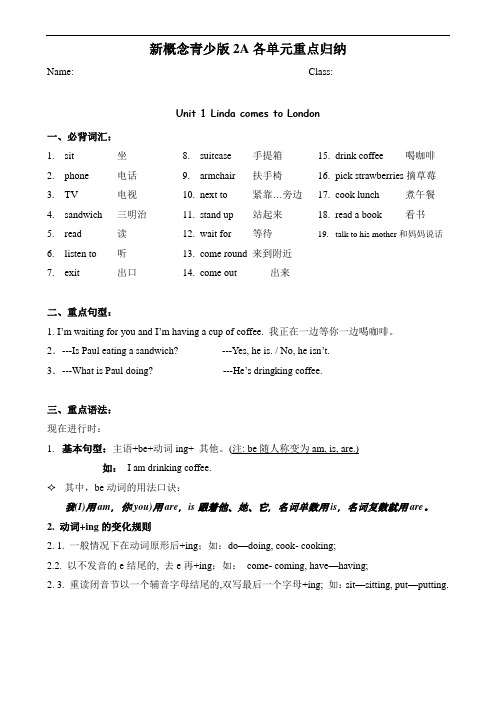
新概念青少版2A各单元重点归纳Name:___________________ Class:___________________Unit 1 Linda comes to London一、必背词汇:1.sit 坐2.phone 电话 电视4.sandwich 三明治5.read 读6.listen to 听7.exit 出口8.suitcase 手提箱9.armchair 扶手椅10.next to 紧靠…旁边11.stand up 站起来12.wait for 等待e round 来到附近e out 出来15.drink coffee 喝咖啡16.pick strawberries摘草莓17.cook lunch 煮午餐18.read a book 看书19.talk to his mother和妈妈说话二、重点句型:1. I’m waiting for you and I’m having a cup of coffee. 我正在一边等你一边喝咖啡。
2.---Is Paul eating a sandwich? ---Yes, he is. / No, he isn’t.3.---What is Paul doing? ---He’s dringking coffee.三、重点语法:现在进行时:1.基本句型:主语+be+动词ing+ 其他。
(注: be随人称变为am, is, are.)如:I am drinking coffee.其中,be动词的用法口诀:我(I)用am,你(you)用are,is跟着他、她、它,名词单数用is,名词复数就用are。
2. 动词+ing的变化规则2. 1. 一般情况下在动词原形后+ing;如:do—doing, cook- cooking;2.2. 以不发音的e结尾的, 去e再+ing;如:come- coming, have—having;2. 3. 重读闭音节以一个辅音字母结尾的,双写最后一个字母+ing; 如:sit—sitting, put—putting.Unit 2 Good luck on Sunday!一、重点词汇:1.visit 参观,访问2.visitor 参观者3.noisy 嘈杂的4.village 村庄ugh 大笑6.film 电影7.say 说话8.town 市镇,城镇9.city 城市10.radio 收音机11.learn 学习12.news 新闻13.quiet 安静的14.television 电视机15.luck 运气16.center 中心e home 回家18.listen to the radio听收音机19.learn English 学习英语20.watch the news 看新闻21.play football 踢足球22.have lunch 吃午餐23.go out 外出24.hundreds of 数以百计的25.thousands of 数以千计26.look forward to 盼望,期望二、重点句型:1. --- Are Robert and Lucy waiting for a taxi? 罗伯特和露西在等出租车么?---Yes, they are. / No, they aren’t.2. ---What are Robert and Lucy doing? 罗伯特和露西在做什么?--- They are waiting for a bus. 他们正在等公交车。
(完整版)新概念青少版2A复习总结(语法)

新概念2A总复习Part 1 时态1、基本结构:be+doing (do代指所有动词原形)肯定句:主语+am/is/are+doing......My mother is talking with the dentist.否定句:主语+am/is/are not+doing...They aren’t playing games.一般疑问句:Is/Are+主语+doing...? Yes,主语+am/is/are...Is she waiting for a bus? No,主语+am/is/are not.特殊疑问句:特殊疑问词+is/are+主语+doing....?Where are they doing their homework?2、动词现在分词变化规则:1)一般情况下,直接在动词后加-ingwork ---- working sleep ----- sleeping study ----- studying2) 动词以不发音的-e结尾,要去-e加-ingtake ----- taking make ----- making dance ----- dancing3) 重读闭音节的动词,要双写词尾字母,再加-ingcut ----- cutting put ----- putting begin ------ beginning4) 以-ie结尾的动词,把变成y再加-inglie ----- lying tie ----- tying die ----- dying①表示客观事实、真理②经常发生、有规律的事情1、基本结构:①带有be动词: 主语+am/is/are+肯定句:主语+am/is/are+n./adj./prep.短语...The sky is blue.My music book is in the bag.否定句:主语+am/is/are not+n./adj./prep.短语...It isn’t my magazine.The curtain isn’t clean.一般疑问句:Is/Are+主语+n./adj./prep.短语...? Yes,主语+am/is/are.Are these gloves yours? No,主语+am/is/are not.Is there any water in the jug?特殊疑问句:特殊疑问词+is/are+主语+n./adj./prep.短语....?Which one is right?Who is the man in a black hat?②带有实义动词:主语+(never/sometimes/often/usually/always)v.原形/v.三单+....(every morning/day/week.)肯定句:主语+v.原形/三单+.......They usually live in dry places. It sometimes rains in summer. 否定句:主语+don’t /doesn’t +v.原形+....... We don’t go to school on weekends.一般疑问句:Do/Does+主语+v.原形.......? Yes,主语+do/does.Do you always arrive at school very early? No,主语+don’t/doesn’t. Does Lucy have a rest every afternoon?特殊疑问句:特殊疑问词+do/does+主语+v.原形.......?Why does she always arrive so late? 2、动词第三人陈单数变化规则: 1)一般直接在动词尾直接加 s.如: play —plays, want —wants, work —works,know —knows,help —helps, get —gets2)以字母s 、x 、ch 、sh 结尾的动词加-es guess—guesses,fix—fixes,teach—teaches,brush—brushes,watch—watches,catch—catches3)以辅音字母+y 结尾的动词,先变y 为i,再加-es.发音/z/如:study—studies,carry—carries,fly—flies,worry—worries1、学生们在干什么?有一些在打电话,另一些躺在沙滩上。
新概念青少版2A各单元重点归纳
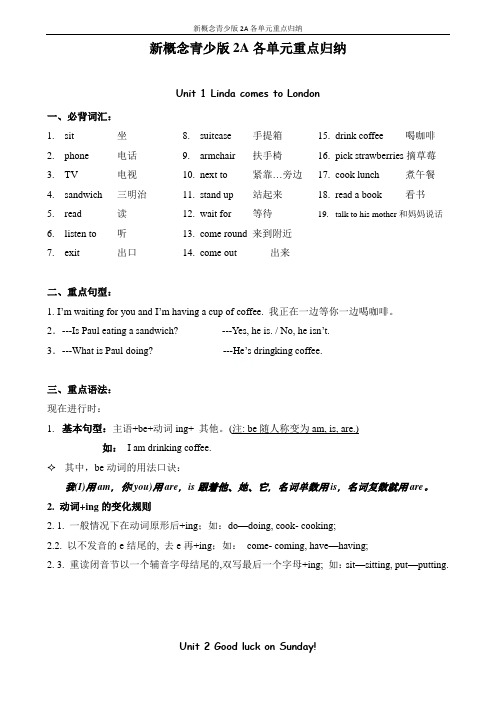
新概念青少版2A各单元重点归纳Unit 1 Linda comes to London一、必背词汇:1.sit 坐2.phone 电话 电视4.sandwich 三明治5.read 读6.listen to 听7.exit 出口8.suitcase 手提箱9.armchair 扶手椅10.next to 紧靠…旁边11.stand up 站起来12.wait for 等待e round 来到附近e out 出来15.drink coffee 喝咖啡16.pick strawberries摘草莓17.cook lunch 煮午餐18.read a book 看书19.talk to his mother和妈妈说话二、重点句型:1. I’m waiting for you and I’m having a cup of coffee. 我正在一边等你一边喝咖啡。
2.---Is Paul eating a sandwich? ---Yes, he is. / No, he isn’t.3.---What is Paul doing? ---He’s dringking coffee.三、重点语法:现在进行时:1.基本句型:主语+be+动词ing+ 其他。
(注: be随人称变为am, is, are.)如:I am drinking coffee.其中,be动词的用法口诀:我(I)用am,你(you)用are,is跟着他、她、它,名词单数用is,名词复数就用are。
2. 动词+ing的变化规则2. 1. 一般情况下在动词原形后+ing;如:do—doing, cook- cooking;2.2. 以不发音的e结尾的, 去e再+ing;如:come- coming, have—having;2. 3. 重读闭音节以一个辅音字母结尾的,双写最后一个字母+ing; 如:sit—sitting, put—putting.Unit 2 Good luck on Sunday!一、重点词汇:1.visit 参观,访问2.visitor 参观者3.noisy 嘈杂的4.village 村庄ugh 大笑6.film 电影7.say 说话8.town 市镇,城镇9.city 城市10.radio 收音机11.learn 学习12.news 新闻13.quiet 安静的14.television 电视机15.luck 运气16.center 中心e home 回家18.listen to the radio听收音机19.learn English 学习英语20.watch the news 看新闻21.play football 踢足球22.have lunch 吃午餐23.go out 外出24.hundreds of 数以百计的25.thousands of 数以千计26.look forward to 盼望,期望二、重点句型:1. --- Are Robert and Lucy waiting for a taxi? 罗伯特和露西在等出租车么?---Yes, they are. / No, they aren’t.2. ---What are Robert and Lucy doing? 罗伯特和露西在做什么?--- They are waiting for a bus. 他们正在等公交车。
新概念英语青少版2A语法大全

New concept English 2A语法集结一、助动词 do/does 的用法例句:Do you want any breakfast ,PaulHow much juice do you wantI don’t want any coffee, but I want some tea .这里,我们看这几个句子既出现了实义动词want,又出现了do,仔细观察发现:这些句子都是在的帮助下形成的,因此称这个do为助动词。
助动词在句中不能独立使用作谓语,并通常用于主语为第一人称、第二人称或者第三人称复数的疑问句和否定句中。
【第三人称复数:人称代词分为第一人称、第二人称、第三人称。
单数是指一个人,多于一个人就为复数。
We(我们)、You(你们)、They(他们/她们/它们) 分别是第一人称、第二人称、第三人称的复数形式。
】1、将一个肯定句变为疑问句时,应将do/does放在主语的前面,实义动词用原形。
例句:I/ We / You want some yoghurt. →Do you want any yoghurtWilliam wants some beer.→Does William want any beer She likes that one. →Does she like that one2、变否定句时则要在句中谓语动词的前面加do not(don’t)或doesn’t。
例句:I don’t want any coffee, but I want some tea .She doesn’t like that one. →Doesn’t she like that one William wants some beer.→William doesn’t want any beer.3、变特殊疑问句时,见一、2、D/讲解部分及特殊疑问词部分。
二、Can/Must/May等情态动词的用法1、can的具体用法:can是情态动词,不能在句中单独作谓语,必须和其他动词原形构成谓语。
Unit13TheKalenjin知识点(讲义)新概念英语青少版2A

Unit 13 The Kalenjin 卡兰津人一、重点单词及拓展:1.record 动词/名词,记录(注意词性不同,发音不同)短语:make a record (make records)做记录break a record (break records) 破纪录hold/keep a record(hold/keep records)保持纪录record做动词时,就是普通动词,records--recording--recorded2.among 一般用于三者或三者以上的“在……中间”,其宾语通常是一个表示笼统数量或具有复数意义的名词或代词。
between一般指两者之间,其宾语往往是一个具体数目的人(物),或者是由and连接的两个具体的人(物)。
短语:between...and... 在...和...之间例:Tom’ s house is among the trees. Tom的房子在树林之中。
There was a fight between the two boys. 两个男孩之间发生了争斗。
The bank is between the hotel and the post office. 银行在酒店和邮局之间。
专项练习1:用between或among填空1)________the door and the window there is a map.2)I sit_________my brother and sister watching the game.3)I can see her________the students.4)We will have a meeting________10:00 and 12:00.5)That girl is singing happily_________the crowded.(人群)3.与东、西、南、北有关的名词及部分短语north(N)northwest northeastwest(W)east(E)southwest southeastsouth(S)识记小窍门:NEWS(北东西南---谐音“背东西难”)短语:in the + 东/南/西/北等方位名词:“在某范围之内”,强调两者“包含关系”例:Beijing is in the north of China. 北京在中国的北部。
新概念青少版2A复习总结[语法]
![新概念青少版2A复习总结[语法]](https://img.taocdn.com/s3/m/1f55c4a5852458fb760b5669.png)
新概念青少版2A复习总结[语法]新概念青少版2A复习总结[语法]编辑整理:尊敬的读者朋友们:这里是精品文档编辑中心,本文档内容是由我和我的同事精心编辑整理后发布的,发布之前我们对文中内容进行仔细校对,但是难免会有疏漏的地方,但是任然希望(新概念青少版2A复习总结[语法])的内容能够给您的工作和学习带来便利。
同时也真诚的希望收到您的建议和反馈,这将是我们进步的源泉,前进的动力。
本文可编辑可修改,如果觉得对您有帮助请收藏以便随时查阅,最后祝您生活愉快业绩进步,以下为新概念青少版2A复习总结[语法]的全部内容。
新概念青少版2A复习总结[语法]新概念2A总复习Part 1 时态一、现在进行时:表示说话时正在做的事情1、基本结构:be+doing (do代指所有动词原形)肯定句:主语+am/is/are+doing。
....My mother is talking with the dentist。
否定句:主语+am/is/are not+doing.。
They aren’t playing games。
一般疑问句:Is/Are+主语+doing.。
.? Yes,主语+am/is/are..。
Is she waiting for a bus? No,主语+am/is/are not。
特殊疑问句:特殊疑问词+is/are+主语+doing。
.。
?Where are they doing their homework?2、动词现在分词变化规则:1)一般情况下,直接在动词后加-ingwork -—-— working sleep —-—-— sleeping study ----—studying2) 动词以不发音的-e结尾,要去-e加-ingtake ——--- taking make —-—-— making dance ---—- dancing3)重读闭音节的动词,要双写词尾字母,再加-ingcut —-——- cutting put ——--—putting begin —---——beginning 4) 以-ie结尾的动词,把变成y再加-inglie —---- lying tie ———-- tying die -—-—— dying二、一般现在时: 表示客观事实、真理 经常发生、有规律的事情1、基本结构:带有be动词:主语+am/is/are+肯定句:主语+am/is/are+n。
青少版新概念2Aunit8知识点总结(活动za)
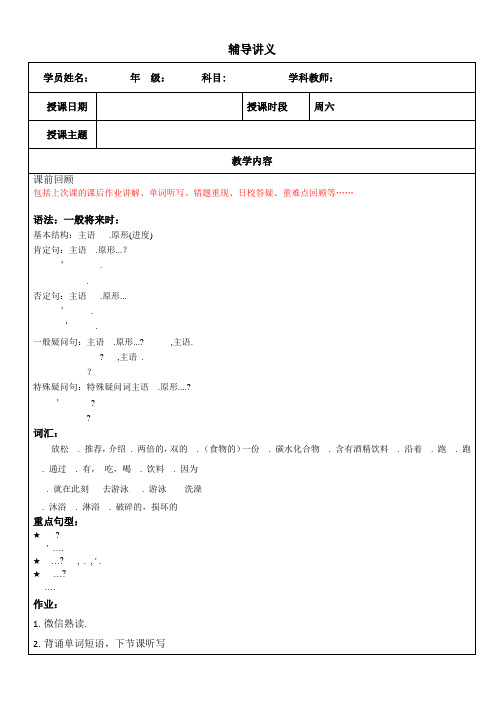
辅导讲义
学员姓名:年级:科目: 学科教师:
授课日期授课时段周六
授课主题
教学内容
课前回顾
包括上次课的课后作业讲解、单词听写、错题重现、日校答疑、重难点回顾等……
语法:一般将来时:
基本结构:主语.原形(进度)
肯定句:主语 .原形...?
’.
.
否定句:主语.原形...
’.
’.
一般疑问句:主语 .原形...? ,主语.
? ,主语.
?
特殊疑问句:特殊疑问词主语 .原形....?
’?
?
词汇:
放松 . 推荐,介绍. 两倍的,双的. (食物的)一份 . 碳水化合物. 含有酒精饮料 . 沿着. 跑. 跑. 通过. 有,吃,喝. 饮料. 因为
. 就在此刻去游泳. 游泳洗澡
. 沐浴. 淋浴. 破碎的,损坏的
重点句型:
★ ?
' ….
★…? , . , ' .
★…?
….
作业:
1.微信熟读.
2.背诵单词短语,下节课听写
3.完成练习册
4.每天听语音资料分钟并大声跟读。
最新青少版新概念英语2A教学重点(1)

P30
★Don't take your gloves off.
★祈使句
表建议,命令,请求等,省略主语,直接用谓语动词开头。
Unit 5
All about ants!
P36
P38
★What time is it? / What's the time?
It's ….
★When do you…?
I usually….at….
★时间表达法
……past/to……
半小时以内含半小时,用past,半小时以后用to。
Unit 6
An elegant size
P44
P46
★When do sb. and sb. do sth.?
Unit 7
A good example
P52
P54
★How many times a week does he go to the cinema?
★一般过去时
定义:一般过去时表示过去某个时间发生的动作或存在的状态。常和表示过去的时间状语连用。如:last year(去年), yesterday(昨天)等;也可表示过去经常反复发生的动作,常和often, always等频率副词连用。
“碧芝”的成功归于他的唯一,这独一无二的物品就吸引了各种女性的眼光。
3、竞争对手分析
Unit 12
TheLondonbus
P92
P94
★Were sb. and sb. at school an hour ago?
Yes, they were. / No, they weren't.
★Where were sb. and sb. an hour ago?
- 1、下载文档前请自行甄别文档内容的完整性,平台不提供额外的编辑、内容补充、找答案等附加服务。
- 2、"仅部分预览"的文档,不可在线预览部分如存在完整性等问题,可反馈申请退款(可完整预览的文档不适用该条件!)。
- 3、如文档侵犯您的权益,请联系客服反馈,我们会尽快为您处理(人工客服工作时间:9:00-18:30)。
语法大全2A新概念英语青少版.New concept English 2A语法集结一、助动词 do/does 的用法例句:Do you want any breakfast ,Paul ?How much juice do you want ?I don't want any coffee, but I want some tea .这里,我们看这几个句子既出现了实义动词want,又出现了do,仔细观察发现:这些句子都是在的帮助下形成的,因此称这个do为助动词。
助动词在句中不能独立使用作谓语,并通常用于主语为第一人称、第二人称或者第三人称复数的疑问句和否定句中。
【第三人称复数:人称代词分为第一人称、第二人称、第三人称。
单数是指一个人,多于一个人就为复数。
We(我们)、You(你们)、They(他们/她们/它们) 分别是第一人称、第二人称、第三人称的复数形式。
】1、将一个肯定句变为疑问句时,应将do/does放在主语的前面,实义动词用原形。
例句:I/ We / You want some yoghurt. →Do you want any yoghurt ?beer?any want William Does →beer.some wants WilliamShe likes that one. →Does she like that one?2、变否定句时则要在句中谓语动词的前面加do not(don't)或doesn't。
例句:I don't want any coffee, but I want some tea .She doesn't like that one. →Doesn't she like that one? William wants some beer.→William doesn't want any beer. 3、变特殊疑问句时,见一、2、D/讲解部分及特殊疑问词部分。
二、Can/Must/May等情态动词的用法1、can的具体用法:can是情态动词,不能在句中单独作谓语,必须和其他动词原形构成谓语。
情态动词没有人称和数的变化,也就是说,不管主语是第几人称,单数还是复数,can都没有变化。
即表示能力,也表示可能性。
【口诀:can的用法很重要,千变万化都知道。
肯定用can加原形,否定把can变can't,疑问can就往前提,原形留在主语后。
细心体会多练习,保证不会犯错误。
】例如:肯定句:Vikki can drive a car.变否定句:Vikki can't drive a car.变一般疑问句:Can Vikki drive a car?变特殊疑问句:Who can drive a car?2、must的具体用法:must与can一样,都是情态动词,不能在也没有人称和数的必须和其他动词原形构成谓语。
句中单独作谓语,变化.must是“必须”的意思,表示语气强烈的命令、意图等。
在否定句和疑问句的用法也与can一样。
You must eat.Must you go now?I can drink some water ,but I mustn't eat.3、can't与mustn't的区别:can't 意即“不能,不会”,表示不可能、无法;mustn't而意为“禁止,不可以”,表示强烈的建议、意图和命令等,语气强硬。
4、may的具体用法:助词。
1) (表示可能性)可能,也许:She may be a nurse.2)(表示许可或请求许可)可以:May I come in? Yes, please.3)(表示希望、祝愿等)祝,愿:May you succeed!4) (表示目的)(以便)能,(使...)可以They try to cure the disease so that people may live longer. 他们设法根治该病以便使人们活得更长些。
5) (用于问句中,表示不确定)会,究竟:Who may the man be? 这个人会是谁呢?6) 表示期望)能够,会:We hope she may win. 我们希望她会获胜。
三、have/has got的用法在英语中通常用 have got代替 have,当主语为第三人称单数可以与前面的主语has got或have got ,has代替has got 时,用.缩写为've 或‘s。
1)肯定式:We've (We have )got an English lesson today. Lucy and Tom have got two chairs.My parents have got a big house.You have got everything. 你什么都有了。
He has got terrible toothache.2):否定式:在have got 中,have 为助动词,在其后加否定词not, 就可以构成否定句。
Have/Has not got=haven't/has n't got 如:They haven't got computer lessons this week.He hasn't got a pencil.My mother hasn't got much money.3)、一般疑问句及回答:只需将have或has提前到句首即可。
回答时协助于助动词have或has.如:Have you got a notebook?---Yes, I have./No, I haven't.Have they got a library?---Yes, they have./No, they haven't.Has Tom got stomach-ache?---Yes, he has./No, he hasn't.4)、特殊问句:只需选用恰当的疑问词,再接正确的一般疑问句即可。
How many rulers have they got?When have they got this school?What has he got ?【特别提醒】:只能用have/has,不能用have /has got的情形。
◆在助动词或情态动词之后,不能用have /has got 。
He hasn't got a computer.(T)(F) He doesn't have got a computer.He doesn't have a computer.(T)◆当have与动词转化而来的名词构成短语时,不能用have /has got 。
Have a look, have a break, have a drink◆在一些固定搭配中,不能用have /has got 。
Have a good time, have breakfast, have lessons四、some与any的用法:1、some:一般用于肯定句中,意思是“几个、一些、某个”,作定语时可修饰可数名词或不可数名词。
如:I have some work to do today. (今天我有些事情要做)They will go there some day.(他们有朝一日会去那儿)2、any:一般用于疑问句或否定句中,意思是“任何一些、任何一个”,作定语时可修饰可数或不可数名词。
如:They didn't have any friends here.Have you got any questions to ask?(你有问题要问吗?)【注意】◆some 用于疑问句时,表示建议、请求或希望得到肯定回答。
你要加糖的咖啡吗?Would you like some coffee with sugar?如:any with “任何的”。
Come here ◆any 用于肯定句时,意思是随便带什么朋友来吧。
friend.:1、I must eat some food.测试:变否定句--I feel a bit hungry.2、t you have bread?' --Why don A. any B. some C. little D. a五、可数名词与不可数名词:1、可数名词:普通名词所表示的人或事物是可以按个数计算的,这类名词叫可数名词。
可数名词分为个体名词(表示某类人或事物中的个体,如worker, farmer, desk, factory等)和集体名词(表示作为一个整体来看的一群人或一些事物,如people, family 等)。
可数名词有单数和复数两种形式。
指一个人或一件事物时,用单数形式;指两个或多个人或事物时用复数形式。
名词由单数形式变成复数形式的规则如下:1). 一般的名词词尾直接加-s 。
book → books/room → rooms /house → houses / day → days2). 以s, ss, ch, sh, x 结尾的名词,在词尾加-es 。
如:bus → buses /glass → glasses /watch → watchesdish → dishes /box → boxes如:。
-es再加i改为y要先将结尾的名词,礫辅音字母以3).city → cities /body → bodies /factory → factories 4). 以f 或fe 结尾的名词,要将f或fe改为v再加-es。
如:half → halves leaf → leavesknife → knives wife → wives5). 特例[悄悄话:特例常常考,要记住。
]① child → children② man → men woman → womenpoliceman → policemen(规律:man → men)③ tomato → tomatoes potato → potatoes[悄悄话:初中英语以o 结尾的名词变复数时只有这两个词加-es,其余的当然加-s喽!如:photo → photos,radio→radios ]④ foot → feet tooth → teeth[悄悄话: oo变成ee。
]⑤ sheep, Chinese, Japanese [悄悄话:单/复数同形。
]⑥ people单数形式表示复数意义,要求谓语动词用复数;people的复数形式peoples通常指“多个民族”。
2、不可数名词:如果普通名词所表示的事物是不能按个数来计算的,这类名词就叫不可数名词。
